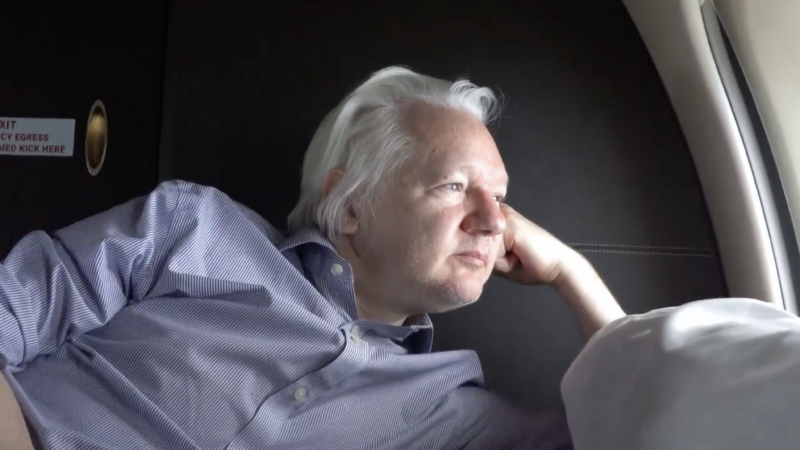The Legacy of Assange's Prosecution
Julian Assange is free, but information isn't.

Julian Assange was released from prison this week after agreeing to plead guilty to conspiring to disclose classified documents related to national security. After five years behind bars, it's hard to exactly call this a win for the WikiLeaks founder. But on the surface, it is a loss for the U.S. government, which wanted to put Assange away for a much, much longer period of time.
And yet, on some level, authorities got exactly what it seems they wanted: a warning to anyone who would dare to publish information that makes the government look bad. It provides a clear view of what happens when you actively try to expose government secrets. Shots have already been fired against future renegade journalists.
"I hope journalists and editors and publishers everywhere realize the danger of the US case against Julian that criminalizes, that has secured a conviction for, news gathering and publishing information that was true, that the public deserved to know," said Assange's wife, Stella, at a press conference in Australia today. "That precedent now can and will be used in the future against the rest of the press."
Even if that prediction doesn't exactly come to pass, Assange's prosecution almost certainly serves as a deterrent for journalists who would encourage whistleblowers (as Assange did with Chelsea Manning) or any outlet that would aim to function, like WikiLeaks, as a source for unredacted publications of government information.
And while social media was supposed to make exposing government corruption easier, its current iteration only makes more clear why entities like WikiLeaks are so necessary.
You are reading Sex & Tech, from Elizabeth Nolan Brown. Get more of Elizabeth's sex, tech, bodily autonomy, law, and online culture coverage.
5 Years Behind Bars for Exposing U.S. War Brutality
Julian Assange "left Belmarsh maximum security prison on the morning of 24 June, after having spent 1901 days there," WikiLeaks posted to X (formerly Twitter) on Monday night. "After more than five years in a 2x3 metre cell, isolated 23 hours a day, he will soon reunite with his wife Stella Assange, and their children, who have only known their father from behind bars."
Assange is now back in Australia, where he is from.
Landing in 30 minutes. Julian Assange is in US airspace.
Follow flight VJT199: https://t.co/gxcbvNyvnj #AssangeJet pic.twitter.com/sgwdF0MMiY
— WikiLeaks (@wikileaks) June 25, 2024
The acts that cost Assange these five years of his life relate to WikiLeaks 2010-2011 publication of material sent by former Army intelligence analyst Chelsea Manning. In 2018, Assange was indicted on multiple counts related to the publication of this material, which, among other things, exposed the cruelty and carelessness of U.S. military actions in Iraq.
Assange was eventually indicted on 18 counts, which came with a maximum sentence of 170 years in prison.
At a hearing yesterday in the U.S. District Court for the Northern Mariana Islands, Assange pleaded guilty to one count of conspiring to unlawfully obtain and disclose classified national security documents. He "received a court-imposed 62-month time-served sentence, reflecting the time he served in U.K. prison as a result of the U.S. charges," the Department of Justice said.
The case has obviously been a travesty for Assange and his loved ones, but it also goes so much beyond them.
Making a Mockery of the First Amendment
As Stella Assange pointed out, the prosecution paves the way for journalists of all sorts—including investigative reporters and national security writers at major newspapers—to be prosecuted for publishing pieces about classified information. It seriously imperils the free press and makes a mockery of the First Amendment, which should protect publishing information about the government even if someone else broke the law in obtaining that information.
It seems impossible that this episode hasn't chilled enthusiasm for reporting on or publishing leaked information, or that it won't continue to do so for a long time to come.
The treatment of Assange serves as a warning to anyone who would so much as write about leaked information, not to mention publish classified documents, especially on the scale of something like WikiLeaks.
"It is in the interest of all of the press to seek for this current state of affairs to change through reform of the Espionage Act," said Stella Assange. "Through increased press protections, and yes, eventually when the time comes—not today—a pardon."
Exposing the Need for Independent Platforms
There was a time when some people talked about social media like it would serve a sort of WikiLeaks function—that it would be a democratizing force, enabling citizen journalists, anonymous speech, and people speaking out against abuses of power.
But social media's current iteration only makes it more clear why sites like Wikileaks are so important.
Bullied by politicians and regulators and beset with lawsuits, social media platforms have become increasingly censorious. "Jawboning" efforts by authorities encourage platforms to crack down on speech that makes people in power uncomfortable. And tech companies have proved willing to work closely with law enforcement to turn over information on the accounts of anyone whom officials want to unmask.
Social media now often seems like the government's lapdog. WikiLeaks was something different, something that they couldn't control.
After years of seeing how Assange was treated, or how the government has gone after other publishers who wouldn't kowtow to their tastes (like the founders of Backpage), it isn't surprising that tech leaders today would be wary of crossing the feds too much. Perhaps today's speech-squelching social media environment can be traced partly back to the Assange prosecution, too. (Certainly, the treatment of things like Hunter Biden's laptop story show shades of fear in this direction.)
Despite all this, I'm still something of an evangelist for the liberatory power of social media (it's at least better than the former gatekeepers everywhere system). But there's no denying that social media platforms are often non-conducive to fostering free speech generally, let alone fostering speech that the government wants hidden.
We still need platforms like WikiLeaks, and more of them. We still need people like Chelsea Manning, Edward Snowden, and Reality Winner, who are willing to risk their jobs and their freedom to expose things authorities would rather they not. And we still need people like Julian Assange, who are willing to publish what the Mannings and the Snowdens of the world risk so much for.
Assange's prosecution and conviction make all of this less likely—which makes it more likely that the American people will find out less about civil liberties abuses, wartime tactics, and more. The legacy of the Assange case is more government secrecy and all of us being a little more in the dark about what those who rule this country are doing.
More Sex & Tech News
• A study finds Texas' abortion ban linked to an increase in infant mortality. "Between 2021 and 2022, infant deaths in Texas increased from 1,985 to 2,240, or 255 additional deaths. This corresponds to a 12.9 percent increase, whereas the rest of the US experienced a comparatively lower 1.8 percent increase," write researchers in a new paper from Johns Hopkins University.
• The U.S. Supreme Court has agreed to hear a case concerning the constitutionality of a Tennessee law banning hormone therapy and puberty blockers for minors. The Court's decision to take up the case is already having an effect, reports Chris Geidner at LawDork:
U.S. District Judge Liles Burke, who initially blocked Alabama's ban on gender-affirming care for minors1 in 2022 before being overturned by a panel of the U.S. Court of Appeals for the Eleventh Circuit in 2023, asked lawyers on Monday afternoon about the effect on proceedings in his court of the Supreme Court's decision to hear a challenge to Tennessee's similar ban. By the end of the day Tuesday, both the Justice Department and private individuals challenging the law asked for proceedings to be halted until the Supreme Court rules.
• Arkansas is suing the shopping app Temu.
• A new lawsuit challenges Tennessee's "abortion trafficking" law, arguing that it's unconstitutional on First Amendment grounds.
• Google says that implementing the Play Store changes that Epic Games wants would cost more than $237 million, create security risks, and harm Google's reputation.
• Department of "this isn't actually about antitrust, it's about punishing and getting money from big tech companies": "European Union antitrust authorities opened a formal complaint against Microsoft on Tuesday over the company's bundling of its Teams communications program with its Office 365 suites, calling out as insufficient the disconnection of the services Microsoft initiated last year to appease enforcers," Law360 reports.
Today's Image



Show Comments (18)